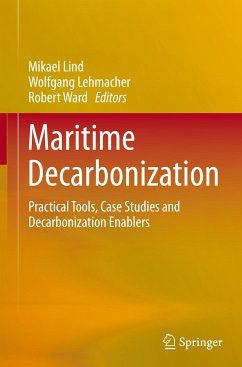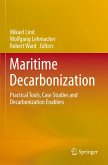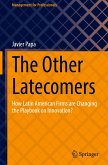Maritime Decarbonization
Practical Tools, Case Studies and Decarbonization Enablers
Herausgegeben:Lind, Mikael; Lehmacher, Wolfgang; Ward, Robert
Maritime Decarbonization
Practical Tools, Case Studies and Decarbonization Enablers
Herausgegeben:Lind, Mikael; Lehmacher, Wolfgang; Ward, Robert
- Gebundenes Buch
- Merkliste
- Auf die Merkliste
- Bewerten Bewerten
- Teilen
- Produkt teilen
- Produkterinnerung
- Produkterinnerung
This volume analyses maritime decarbonization from various perspectives. It contains unique approaches and tools in four areas: scenarios, value chains, enablers, and partnerships.
Decarbonization has become a very important focus in the maritime industry. Anyone that delves into the topic quickly appreciates its breadth and complexity. Minimizing greenhouse gases (GHG) emissions in maritime practices at large and doing it swiftly is far from simple. The Paris 2015 climate goals and the IMO ambitions may be the industry's guiding lights. But is this enough? Probably not. At the managerial…mehr
Andere Kunden interessierten sich auch für
![Maritime Decarbonization Maritime Decarbonization]() Maritime Decarbonization49,99 €
Maritime Decarbonization49,99 €![Decision Making in Interdisciplinary Renewable Energy Projects Decision Making in Interdisciplinary Renewable Energy Projects]() Decision Making in Interdisciplinary Renewable Energy Projects119,99 €
Decision Making in Interdisciplinary Renewable Energy Projects119,99 €![Climate Governance and Corporate Eco-innovation Climate Governance and Corporate Eco-innovation]() Climate Governance and Corporate Eco-innovation119,99 €
Climate Governance and Corporate Eco-innovation119,99 €![The World¿s Future Crisis: Extractive Resources Depletion The World¿s Future Crisis: Extractive Resources Depletion]() Shahla SeifiThe World¿s Future Crisis: Extractive Resources Depletion90,99 €
Shahla SeifiThe World¿s Future Crisis: Extractive Resources Depletion90,99 €![The World¿s Future Crisis: Extractive Resources Depletion The World¿s Future Crisis: Extractive Resources Depletion]() Shahla SeifiThe World¿s Future Crisis: Extractive Resources Depletion90,99 €
Shahla SeifiThe World¿s Future Crisis: Extractive Resources Depletion90,99 €![The Great Transition to a Green and Circular Economy The Great Transition to a Green and Circular Economy]() Gitte HaarThe Great Transition to a Green and Circular Economy67,99 €
Gitte HaarThe Great Transition to a Green and Circular Economy67,99 €![The Other Latecomers The Other Latecomers]() Javier PapaThe Other Latecomers64,99 €
Javier PapaThe Other Latecomers64,99 €-
-
-
This volume analyses maritime decarbonization from various perspectives. It contains unique approaches and tools in four areas: scenarios, value chains, enablers, and partnerships.
Decarbonization has become a very important focus in the maritime industry. Anyone that delves into the topic quickly appreciates its breadth and complexity. Minimizing greenhouse gases (GHG) emissions in maritime practices at large and doing it swiftly is far from simple. The Paris 2015 climate goals and the IMO ambitions may be the industry's guiding lights. But is this enough? Probably not. At the managerial level a paradigm shift is needed: from a fixed mindset that is calling for compensation to a growth mindset that seeks to capture the benefits of decarbonization. This will require a structured approach in the form of practical frameworks and clear recommendations. In this book 75 scholars and industry and subject matter experts have joined forces to explore different scenarios, valuechain designs, decarbonization enablers, and partnership models to develop frameworks and recommendations around how to effectively work and make progress. The books offers a valuable mix of theory, practical tools, and real-life cases.
Decarbonization has become a very important focus in the maritime industry. Anyone that delves into the topic quickly appreciates its breadth and complexity. Minimizing greenhouse gases (GHG) emissions in maritime practices at large and doing it swiftly is far from simple. The Paris 2015 climate goals and the IMO ambitions may be the industry's guiding lights. But is this enough? Probably not. At the managerial level a paradigm shift is needed: from a fixed mindset that is calling for compensation to a growth mindset that seeks to capture the benefits of decarbonization. This will require a structured approach in the form of practical frameworks and clear recommendations. In this book 75 scholars and industry and subject matter experts have joined forces to explore different scenarios, valuechain designs, decarbonization enablers, and partnership models to develop frameworks and recommendations around how to effectively work and make progress. The books offers a valuable mix of theory, practical tools, and real-life cases.
Produktdetails
- Produktdetails
- Verlag: Springer / Springer Nature Switzerland / Springer, Berlin
- Artikelnr. des Verlages: 978-3-031-39935-0
- 1st edition 2023
- Seitenzahl: 544
- Erscheinungstermin: 21. Oktober 2023
- Englisch
- Abmessung: 241mm x 160mm x 35mm
- Gewicht: 975g
- ISBN-13: 9783031399350
- ISBN-10: 3031399358
- Artikelnr.: 68336625
- Herstellerkennzeichnung Die Herstellerinformationen sind derzeit nicht verfügbar.
- Verlag: Springer / Springer Nature Switzerland / Springer, Berlin
- Artikelnr. des Verlages: 978-3-031-39935-0
- 1st edition 2023
- Seitenzahl: 544
- Erscheinungstermin: 21. Oktober 2023
- Englisch
- Abmessung: 241mm x 160mm x 35mm
- Gewicht: 975g
- ISBN-13: 9783031399350
- ISBN-10: 3031399358
- Artikelnr.: 68336625
- Herstellerkennzeichnung Die Herstellerinformationen sind derzeit nicht verfügbar.
Mikael Lind is the world's first Adjunct Professor of Maritime Informatics and is engaged at Chalmers, Sweden, and the Research Institutes of Sweden (RISE). He serves as an expert for World Economic Forum, Europe's Digital Transport Logistic Forum (DTLF), and UN/CEFACT. He is a well-recognized trade press author, a co-editor of the two reference books 'Maritime Informatics', and co-author of the recently released 'Practical Playbook for Maritime Decarbonisation'. Together with Wolfgang Lehmacher he has been driving thought leadership by inspiring and helping the maritime industry to overcome the complexities of maritime decarbonisation through a number of articles published in the maritime and logistics trade press. Wolfgang Lehmacher is operating partner at Anchor Group and advisor at Topan AG. The former head of supply chain and transport industries at the World Economic Forum, Geneva and New York, and President and CEO Emeritus of GeoPost Intercontinental, Paris, is advisory board member of The Logistics and Supply Chain Management Society, Singapore, ambassador of The European Freight and Logistics Leaders' Forum, Brussels, advisor of GlobalSF, San Francisco, founding member of the think tanks Logistikweisen, Germany, and NEXST, Singapore, and co-author of the recently released 'Practical Playbook for Maritime Decarbonisation'. Robert Ward was Secretary-General of the International Hydrographic Organization (IHO) until his retirement in late 2017. Prior to that he was Deputy Hydrographer of Australia. For more than 20 years he represented Australia and subsequently the IHO at the highest international levels and played an influential role in the development and implementation of globally implemented digital data exchange standards for nautical charting and e-navigation services. Together with Mikael Lind, he was one of four co-editors of the two reference books 'Maritime Informatics'.
Part 1: Outlining Baseline and Perspectives.- Chapter 1. Broadening the Scope of Decarbonization in the Maritime Sector.- Chapter 2. Decarbonizing the Maritime Industry - Current Environmental Targets and Potential Outcomes.- Chapter 3. The Extent of Decarbonization in the Global Shipping Fleet.- Part 2: a Step by Step Concept for Decarbonizing Shipping.- Chapter 4. Four Steps to Decarbonization.- Chapter 5. Scenario Thinking and Its Place in Maritime Decarbonization.- Chapter 6. Adopting a Value Chain Focus to Tackle Decarbonization.- Chapter 7. Identifying the Key Decarbonization Enablers.- Chapter 8. Decarbonizing International Shipping Through Collaborative Partnerships.- Part 3: Bringing the Four Step-concept to Life.- Chapter 9. How to Get Started: Cdes - a New Paradigm for Tackling Decarbonization Projects.- Chapter 10. Scenario Thinking - to Build Business Advantages That Accelerate Decarbonization.- Chapter 11. How a Value Chain Approach Plays Out in Maritime Decarbonization.- Chapter 12. How to Assess Decarbonization Enablers.- Chapter 13. Effective Partnerships to Support Maritime Decarbonization.- Part 4: Some Critical Success Factors for Fast and Global Decarbonization.- Chapter 14. Ensuring Seafarers Are at the Heart of Decarbonization Action.- Chapter 15. Securing Global Alignment in Regulations Related to Decarbonization.- Chapter 16. Decarbonize Shipping or Decarbonize International Maritime Trade- the Present Contractual Framework and the Need for a New Contractual Architecture.- Chapter 17. Engaging the Global Research Communities in Maritime Decarbonization.- Chapter 18. The Implications of Circular Supply Chains and the Eu Digital Product Passport in Maritime Decarbonization.- Chapter 19. Sustainable Finance in the Maritime Sector.- Part 5: Case Studies: Selected Maritime Decarbonization Initiatives.- Chapter 20. Actions Being Taken by Key Segments to Meet the Decarbonization Targets.- Chapter 21. Maritime Decarbonization - Actions by Cargo Owners - the Shippers' Perspective.- Chapter 22. Practical Decarbonization Action Being Taken by the Shipping Companies.- Chapter 23. Identifying the Best Low-emission Carriers.- Chapter 24. Actions by Ports to Support Green Maritime Operations - a Real Case Study: the Port of Plymouth, UK.- Chapter 25. Towards Ports as Energy Nodes: Strengthening Micro Energy Systems.- Chapter 26. Decarbonization in Shipyard Cities - a Holistic Approach to Sustainability Assessment.- Chapter 27. Ship Engine, Equipment and Fuel Options for Decarbonization.- Chapter 28. Decarbonization Action by Energy Companies.- Chapter 29. Decarbonization Support From Digital Solutions Providers.- Chapter 30. The in-house Production of Biofuel by Shipping Companies - a Case Study.- Chapter 31. Establishing Green Corridors to Accelerate the Use of Alternative Fuels.- Chapter 32. The Getting to Zero Coalition Story.- Part 6: Concluding Remarks - Calling for a Holistic and Inclusive Approach.- Chapter 33. Highlights of the Book - a Menu of Possible Actions for Decarbonization Today and Tomorrow.- Chapter 34. The Destination - a Vision of a Climate Neutral Future.
Part 1: Outlining Baseline and Perspectives.- Chapter 1. Broadening the Scope of Decarbonization in the Maritime Sector.- Chapter 2. Decarbonizing the Maritime Industry - Current Environmental Targets and Potential Outcomes.- Chapter 3. The Extent of Decarbonization in the Global Shipping Fleet.- Part 2: a Step by Step Concept for Decarbonizing Shipping.- Chapter 4. Four Steps to Decarbonization.- Chapter 5. Scenario Thinking and Its Place in Maritime Decarbonization.- Chapter 6. Adopting a Value Chain Focus to Tackle Decarbonization.- Chapter 7. Identifying the Key Decarbonization Enablers.- Chapter 8. Decarbonizing International Shipping Through Collaborative Partnerships.- Part 3: Bringing the Four Step-concept to Life.- Chapter 9. How to Get Started: Cdes - a New Paradigm for Tackling Decarbonization Projects.- Chapter 10. Scenario Thinking - to Build Business Advantages That Accelerate Decarbonization.- Chapter 11. How a Value Chain Approach Plays Out in Maritime Decarbonization.- Chapter 12. How to Assess Decarbonization Enablers.- Chapter 13. Effective Partnerships to Support Maritime Decarbonization.- Part 4: Some Critical Success Factors for Fast and Global Decarbonization.- Chapter 14. Ensuring Seafarers Are at the Heart of Decarbonization Action.- Chapter 15. Securing Global Alignment in Regulations Related to Decarbonization.- Chapter 16. Decarbonize Shipping or Decarbonize International Maritime Trade- the Present Contractual Framework and the Need for a New Contractual Architecture.- Chapter 17. Engaging the Global Research Communities in Maritime Decarbonization.- Chapter 18. The Implications of Circular Supply Chains and the Eu Digital Product Passport in Maritime Decarbonization.- Chapter 19. Sustainable Finance in the Maritime Sector.- Part 5: Case Studies: Selected Maritime Decarbonization Initiatives.- Chapter 20. Actions Being Taken by Key Segments to Meet the Decarbonization Targets.- Chapter 21. Maritime Decarbonization - Actions by Cargo Owners - the Shippers' Perspective.- Chapter 22. Practical Decarbonization Action Being Taken by the Shipping Companies.- Chapter 23. Identifying the Best Low-emission Carriers.- Chapter 24. Actions by Ports to Support Green Maritime Operations - a Real Case Study: the Port of Plymouth, UK.- Chapter 25. Towards Ports as Energy Nodes: Strengthening Micro Energy Systems.- Chapter 26. Decarbonization in Shipyard Cities - a Holistic Approach to Sustainability Assessment.- Chapter 27. Ship Engine, Equipment and Fuel Options for Decarbonization.- Chapter 28. Decarbonization Action by Energy Companies.- Chapter 29. Decarbonization Support From Digital Solutions Providers.- Chapter 30. The in-house Production of Biofuel by Shipping Companies - a Case Study.- Chapter 31. Establishing Green Corridors to Accelerate the Use of Alternative Fuels.- Chapter 32. The Getting to Zero Coalition Story.- Part 6: Concluding Remarks - Calling for a Holistic and Inclusive Approach.- Chapter 33. Highlights of the Book - a Menu of Possible Actions for Decarbonization Today and Tomorrow.- Chapter 34. The Destination - a Vision of a Climate Neutral Future.








